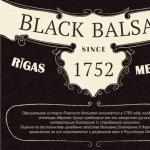Immunity - The body's ability to resist infection, resulting from the presence of blood circulating antibodies and white blood cells (leukocytes). Antibodies are developed specifically to fight antigen antigens formed in the body under various diseases.
Adaptation - The phenomenon in which the response of the senses for a long or repeating stimulation is gradually reduced. For example, a person's smell may adapt to the stimulating effect of one or another odor, so that with the long-term presence from the sense of smell (nose) there are reports of such a smell. Similarly, the adaptation of the conname authorities (skin receptors) leads to the fact that a person may forget about the clothes recently for a while, as it will not feel her touch.
Biological rhythms - cyclic fluctuations in the intensity and nature of biological processes and phenomena. Some biological rhythms are relatively independent (for example, the frequency of heart abbreviations, respiration), others are associated with the adaptation of organisms to geophysical cycles - daily (for example, fluctuations in cell division intensity, metabolism, motor activity of animals), tidal (for example, biological processes in organisms, associated with the level of marine tides), one-year (change in the number and activity of animals, growth and development of plants, etc.).
Stress reaction - This is a non-specific response of the body on any demand presented to it, which is a voltage of the body, aimed at overcoming emerging difficulties and adapt to the increased requirements (adaptive response of the body to the impact of extreme factors (stressogen)).
Homeostasis - the physiological process of maintaining the constancy of the inner medium of the body, in which various parameters of the body (for example, blood pressure, body temperature, acid-alkaline equilibrium) are maintained in equilibrium, despite changing environmental conditions.
Regeneration - (from Latelates. Regeneratio - revival, renewal) in biology, restoration of lost or damaged organs and tissues, as well as the restoration of a whole body from its part.
Psychological protection - A special regulatory system of identity stabilization, a system of mechanisms aimed at minimizing negative experiences - to eliminate or minimize the sense of anxiety associated with the awareness of the conflict, which threatens the integrity of the individual.
Types of immunity.
According to the mechanism of development, the following types of immunity distinguish: Code Immunity, genetically determined by the features of the metabolism of this species. It is mainly associated with the lack of necessary conditions for the reproduction of the pathogen. Acquired immunity occurs during life. It is natural and artificial, each of which can be active and passive. Natural passive immunity Arises as a result of transmission from the mother to the fetus through the placenta (transplacentate) or with milk ready-made protective factors. Natural active immunity Appears as a result of contact with the causative agent after the suffering disease. Artificial passive immunity It is created after administration to the body of finished antibodies with serums of immunized donors. Artificial active immunity It is created after administration to the body of vaccines containing microorganisms or their parts. By reacting systems distinguish local and general immunity. Non-specific protection factors are involved in local immunite, as well as secretory immunoglobulins, which are on the mucous membranes of the nose, bronchi, intestines, etc.
There are also distinguished anti-infectious and non-infectious immunity.
Anti-infectious immunity - A combination of immunity system reactions aimed at removing an infectious agent - causative agent of the disease.
Non-infectious immunity - This is a combination of immunity system reactions aimed at noncommunicable antigens. Depending on the nature of these antigens, it is divided into the following types:
Autoimmunitet - autoimmune reactions of the immunity system on their own antigens. It is due to a violation of the recognition of "his" molecules when they are perceived by the immunity system as "other people" and destroy. Transplantation immunity - It occurs when transplanting organs and tissues from the donor to the recipient. These reactions are associated with the presence of individual sets of molecules on the surface of leukocytes - human leukocyte antigens. The set of these molecules is identical only in single-time twins.
Antitumor immunity - This is the reaction of the immunity system on antigens of tumor cells. Reproductive immunity in the "mother-fruit system". This is the reaction of the immunity of the mother to the antigens of the fetus, as it differs on them due to the genes received from the Father.
Education active Immunity It is observed in the case when its own organism cells produce and remain capable of producing antibodies that are struggle with a developing disease or an infectious agent in a small amount of infectious agent.
Passive immunity , which is extremely short-lived, arises as a result of introducing a person to the human body of finished antibodies contained in immune serum, taken from another person or an animal, which already has immunity to this disease. Baby's body for several weeks after birth has a passive immunity to some common diseases due to the presence of a small number of antibodies that have passed from maternal blood and colostrum.
The difference between serum vaccine.
Vaccine (from Lat. Vacca - cow) - a medical drug from weakened living or dead microorganisms, individual antigenic components of microbial cells and products of the vital activity of these organisms used to immunize human and animals with preventive or therapeutic purposes. Vaccine It contains the causative agent of the disease, and after its introduction, the body for a certain time will produce protection from it - antibodies.
Serum: Blood serum - liquid part of blood without uniform elements and fibrin, resulting in the process of their separation when coaling blood outside the body. Blood serum contains agents of acquired immunity. Dairy serum - a by-product of crushed production.
Serum - These are ready-made antibodies that can be introduced to an infected patient. The shelf life of serum is only 6 months. If during this time it was not useful, i.e. There were no cases of infection in this territory in the territory - it is destroyed.
When the child is born, then in most cases it is healthy and any colds The baby carries relatively easy. True, as long as it feeds on Mother's milk. Adults, we notice that there are categories of people who carry out colds and everything ends for them without complications. And this is despite the fact that you have to be in the team even when the city covers an ARVI or influenza epidemic. Others with the smallest calm fellow traveler on the second day are ill for a long time. Why do people tolerate diseases so differently? It's all about immunite. Be it any kind: Active or passive.
Immunity is a way to protect the organism from various malicious substances and pathogens. The ability to find them and neutralize. And also for a long time to memorize alien organisms and bodies. The ability to form cells - clones capable of dealing with one or another malicious material. Immunity does not appear by itself. This is the result of the coordinated work of the spleen, thymus, red bone marrow, lymph nodes. Special cells, tracking and destroying an internal enemy appear. Track and analyze the degree of threat of macrophages and leukocytes. And thanks to the coordinated work of neutrophils, eosinophils, basophils and monocytes, hostile bodies and microorganisms are destroyed. True, the body itself is configured to their safe life. The organs themselves protect themselves from external influence.
So, the wonderful bactericidal properties have tears, urine, saliva. Moreover:
- In the nose there are flicker cilia, delaying dust and cooling air;
- Incoming reflex - Cough is trying to expel from respiratory system alien elements;
- Human skin is covered with natural antibacterial substances;
- The mucus will not allow malicious microorganisms to settle and multiply under favorable conditions.
In some cases, for example, in disruption of the tissue barrier, an immune response to its own cells is developing.
Views
Nowadays, everyone is trying to systematize to establish some kind of order in all spheres of life. And especially the systematization of diseases is needed to properly determine the pathogens, to choose the medicine. Immunity is also different. It all depends on what nature and methods of its occurrence, which mechanism of development, its prevalence, natural activity, objects of immune reactions. From how long the immune memory, speed and usefulness of reacting systems are supported, immunity may be congenital and acquired. In turn, each of them happens:
- Acquired: passive or active;
- Natural: congenital or acquired.
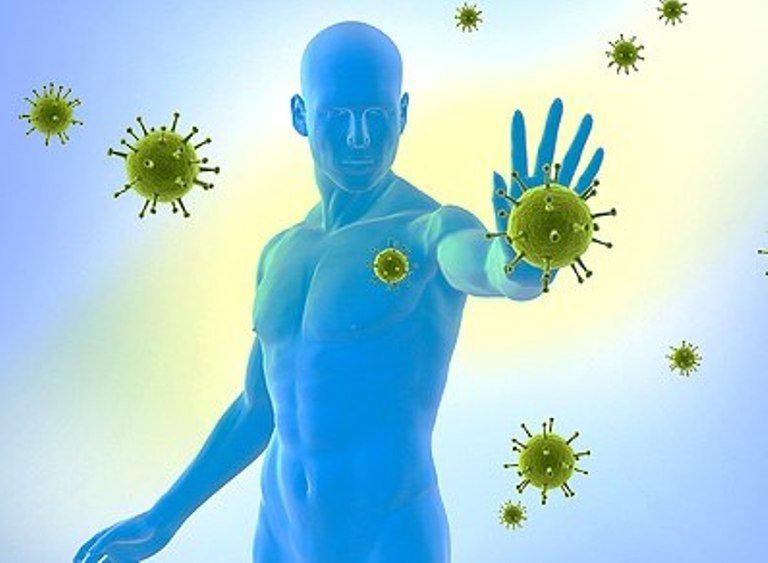
Read about adults and children.
Natural
How to first signs in children?
Congenital
When born little man, His formed and work all organs. Including the immune system. But it is located in a few "insufficient" . And so that the protective forces began to work fully, it will take several months. While the baby has not yet been born, it is from all troubles, including colds, viral, bacterial guards the immune system of the mother. Some of its components are calmly penetrated the baby's blood through the placenta. Even after birth in the blood, the infections are antibodies - immunoglobulins G, strengthening its immune system.
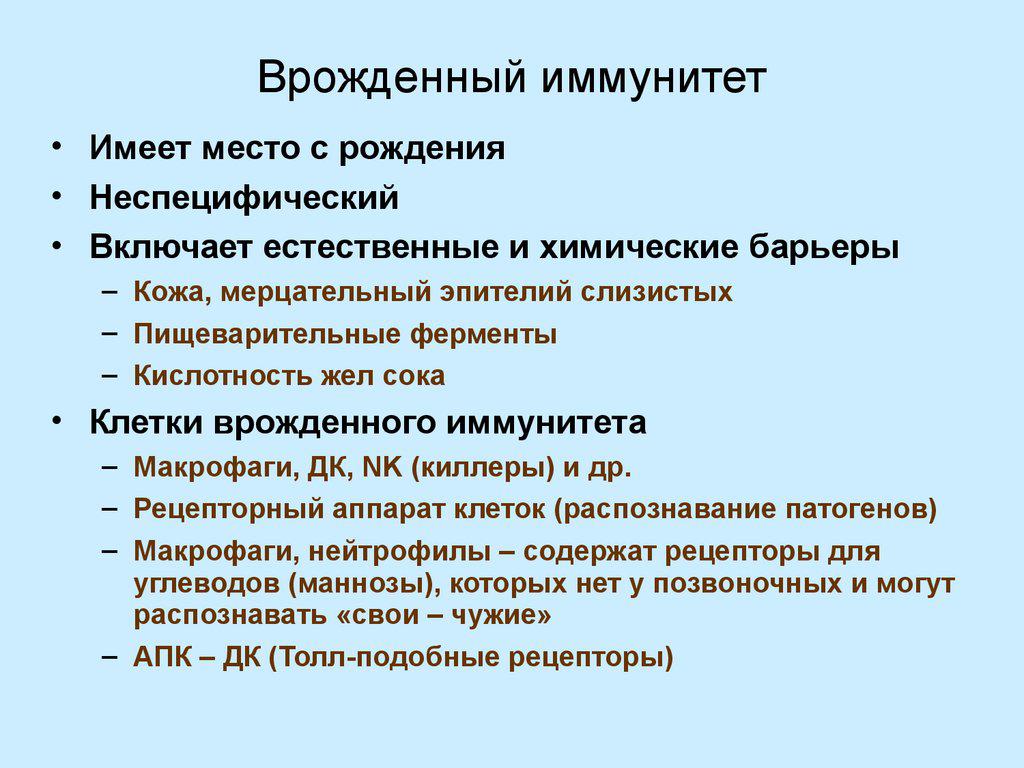
Yes, even breast milk contains others useful material. For example, Immunoglobulin A. The protein is attached to the epithelium of the mucous membranes, which are covered with mouth, stomach, intestines. Therefore, malicious microorganisms can not penetrate and infect kids. But macrophages or neutrophils penetrating the kid with breast milkcan even pass through the intestinal walls. But the protective forces of the baby in most cases are produced only on malicious microorganisms, which was once infected with his mother, or from which it was vaccinated.
All this allows you to form your own immunity.
Congenital protection enough literally for six months, and in best case for a year. Therefore, the child needs to make vaccination. Of course, only with the permission of the pediatrician.
Acquired
Since innate immunity cannot protect a person forever, the acquired immunity is of great importance in his future life (the presence of lymphocyte organism). Some of them find and kill malicious microorganisms. Another group has the ability to memorize foreign and alien antigens and maintain information about them. Subsequently, if it is necessary, I recharge its killer cells. Therefore, if even natural protection, the baby can get from the mother, then after some time acquired immunity appears, because:
- After the suffered disease, antibodies are produced, which are then protected from this disease;
- After the bite of insects there are immunorents. And they possess the necessary memory.
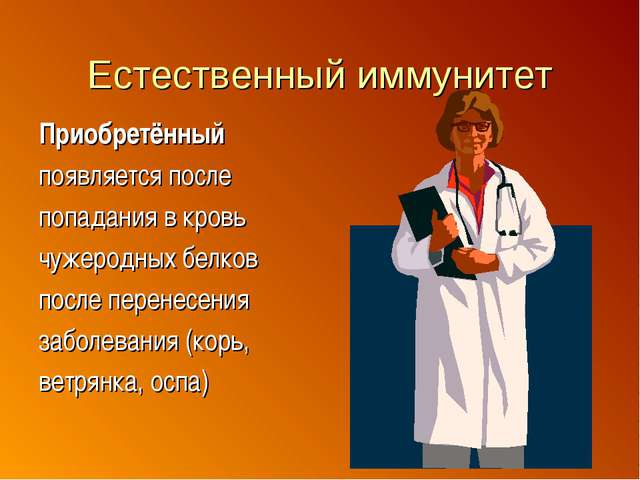
Artificial
Artificial immunity will help not get sick during epidemics, but the administered antibodies do not have long-term memory, although they give a protective effect at the right time. Artificial immunity is active and passive. Active immunity () is created to prevent the disease, and passive (serum introduction) for treatment.
Passive
 What to do, if immediate protection is needed after the bite of some insect or close contacts with infected. Then the artificial barrier is created for some diseases, thanks to the administration of serum or blood transfusion. Serum is ready-made antibodies that are withdrawn from alive blood. Acts quickly, but not long. Not more than two months. But it is effective if it is introduced at the very beginning of the disease. For example, to neutralize the snake poison, you must enter the serum no later than 2-3 hours after the bite. In order to cure a disease, artificial, quickly created passive immunity. Achieved thanks to:
What to do, if immediate protection is needed after the bite of some insect or close contacts with infected. Then the artificial barrier is created for some diseases, thanks to the administration of serum or blood transfusion. Serum is ready-made antibodies that are withdrawn from alive blood. Acts quickly, but not long. Not more than two months. But it is effective if it is introduced at the very beginning of the disease. For example, to neutralize the snake poison, you must enter the serum no later than 2-3 hours after the bite. In order to cure a disease, artificial, quickly created passive immunity. Achieved thanks to:
- The introduction of serum. It contains immunoglobulin, which includes its protective ability;
- Instead of serum, blood can overflow, with immunore agents in it. They find and kill all alien cells.
Serum is effective only in the first hours of the beginning of the disease.
Active
Active or post-specific immunity. The essence of the formation of immunity in this way is the introduction of weakened or killed microorganisms into human blood. After that, the body begins to produce its own antibodies against one or another disease. But when creating artificial active immunity there are contraindications: increased temperature, ailment, postoperative intervention period.

What syrup pregnant women during cough
- Prohibited to apply pregnant women;
- It is not recommended to apply people with malignant neoplasms.
Children must provide permission for a pediatrician procedure.
Approaches to restoration and strengthening
It is necessary to restore immunity after stress, infectious and other diseases, as well as after frequent nervous and physical overworks or living in an environmentally contaminated area.
 After all these adverse factors, the immune system relaxes protection, and a person is increasingly sick. Can I enhance immunity? Before strengthening immunity with medicinal preparations and folk Medicine Need to go to K. healthy image Life:
After all these adverse factors, the immune system relaxes protection, and a person is increasingly sick. Can I enhance immunity? Before strengthening immunity with medicinal preparations and folk Medicine Need to go to K. healthy image Life:
- Getting rid of bad habits.
- Proper and fractional food with an abundance of food rich in a protein. It is also necessary to eat vegetables and fruits in the right amount.
- Physical motor activity.
- Care from stressful states.
- Vitaminotherapy and made of vegetable raw materials (Tincture Echinacea, Eleutherokokka, Ginseng).
- If you have to take antibiotics, then you need to use probiotics immediately (Linex). They are able to preserve the useful intestinal microflora.
Among the drugs can raise the level of immunity interferon, cycloferon. Support and enzymes. It is also necessary to make vaccination from hepatitis and influenza.
You can enhance immunity and folk methods:

After receiving the ragger of rosehips you need to rinse your mouth clean water. Substances in it are corrosive tooth enamel.
Video
conclusions
Immunity is a protective barrier of the human body. But due to certain reasons, such as: stress, transferred diseases, unfavorable ecological situation in the place of residence, bad habits, there is a decrease in the level of protective forces of the body. If it is low, then colds, infectious diseases will be frequent unreasonable guests in the house. Immunity is congenital and artificial. Congenital absorbed literally with mother's milk. The level of artificial is raised with the help of a vaccine, and if a person urgently needs help, then serum is injected. In this case, immunity is formed for a couple of months, but the patient transfers the disease without any complications.
Read pro incubation period Influenza, as it spreads and how to prevent infection. In addition, it will be useful to know the development of tonsillitis.
Artificial immunity is immunity, which is created as a result of activation. immune system or artificial immunization. There are passive and active artificial immunity.
Passive immunity It arises due to the introduction of specific sera, interferons and their mixtures, interleukins, immunoglobulins, bone marrow cells, monocytes, lymphocytes, which artificially activated in vitro. Serum contains ready-made antibodies that make it easier for the course of a developed disease. Passive immunity is created with a primary or severe secondary immunodeficiency.
Active immunity Create by activating the mechanisms of the immune response. For this, vaccines, inductors of interleukins, interferons, activators of phagocytosis systems and complement, mechanisms of natural killers are used. With active immunization, the organism itself is produced by the organism itself, antibodies, interleukins and other immunity factors. Vaccine contains weakened or killed viruses or bacteria. The primary immune response is developing, and after entering a non-boiled pathogen, a secondary answer is also provided, which contributes to the light flow of illness and rapid recovery.
Indications for creating active artificial immunity are:
- planned mass immunoprophylaxis of certain infections;
- frequently repeated respiratory infections and other recurrent infections;
- diseases chronic flowdue to impaired immune system (immunoproliferative, allergic).
Noticed a mistake? Highlight it and click Ctrl + Enter.To let us know.
Liked? Like and save on your page!
3 comments to "artificial immunity"
I treat the category of often sick people, more precisely applied before, until he turned to the immunologist, and after the survey passed, it turned out that with immunity I had a problem. They discharged the drug, which is based on Interferon, Refaferon EU lipint, and it was he who did his job on excellent. Now I don't get sick with colds or influenza.
Immunity - a system that creates a protective barrier preventing into penetration into the human body different species microbes. Immunity is divided into 2 categories:
Congenital. It generated at the genome;
Acquired. It appears throughout life.
When acquired immunity , then divided by The following subcategories:
- Natural passive. It it turns out due to the transfer of man Various views infectious diseases either occur with direct contact with antigensThese are insect bites containing in saliva poison. And also transmitted through a placenta from the future mother to the fetus or when feeding a baby with breast milk;
- Artificial appears after the vaccination procedure, organ transplantation, tissues that make up cells can be purchased due to the use of drugs containing protein.
Depending on which mechanisms contributed to the appearance Artificial immunity He is divided into the following types:
- Active The barrier appears when a vaccine is introduced into the body with microorganisms;
- Artificial passive immunity. Forming after introduction to the body of certain antibodiescontaining donor serum serum, which already have immunity to a specific appearance of the disease.
Treatment Founded on serum , occurs in the event if the vaccination procedure was not performed in advance . For these purposes, passive immunization of people in contact with patients and infected, which are in the first stage, before the organism of own antibodies is occurring.
Such. the procedure is carried out to create artificial passive immunity which is formed after that and has its action only for 2-6 weeks. After all, antibodies have properties to be subjected to such a process as immuno elming.
The main parameters of drugs aimed at the appearance of artificial passive immunity
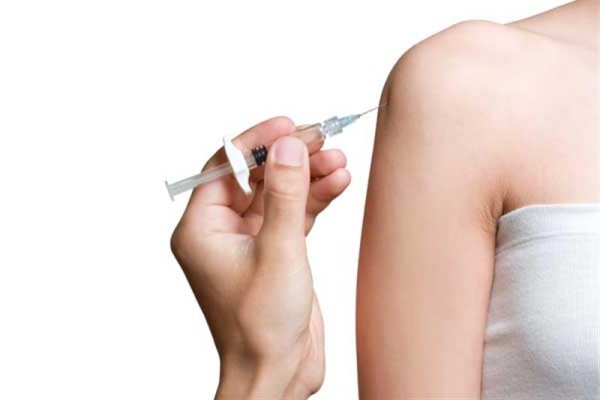 Types of immunity
Types of immunity Applied heterological (the main component - the blood of immunized animals), homological serums (Used blood immunized volunteers).
The main diseases to which heterologous serums are directed - diphtheria, tetanus, botulism, gas gangrene. Mandatory condition When introducing such injections is compliance with all precautions.
Homologous used in the treatment such types of disabilities - cort, viral hepatitis and other infectious diseases .
Despite positive results from drugs, which include serum, they are used with extreme caution, because there is a probability of appearance side Effects And it is possible to transition to some infections.
The safest and most effective option is an injection with immunoglobulin Thus, artificial passive immunity is acquired, which is formed after the introduction of this fund. In medicine against diseases - oPE, hepatitis A, tetanus, diphtheria, cough, chickenpox And the other is applied by immunoglobulin, made of donor human blood.
In this way, the main indications affecting the creation of artificial passive immunity, which is formed after the introduction special preparationsare primary or severe secondary immunodeficiency.
His dignity can be called high speed of the protective barrier. A K. disadvantages can be attributed little validity and minor efficiency.
You may be interested in familiar with the topic from the same category:
Question number 1.
Guard role Immunity
Immunity (lat. immunitas. - Liberation, getting rid of something) - immunity, body resistance to infections and invasions of alien organisms (including pathogenic microorganisms), as well as the effects of alien substances with antigenic properties. Immune reactions occur on their own cells of the body, changed in an antigen.
Provides organism homeostasis at the cellular and molecular level of the organization. Imported by the immune system.
The biological meaning of immunity is to ensure the genetic integrity of the body throughout its individual life. The development of the immune system led to the possibility of the existence of complexly organized multicellular organisms.
The protective role of immunity is applied not only for viruses, simplest, mushrooms, helminths, but also for alien transplants of tissues and organs. It also applies to autoimmune processes arising in the body. For example, in the emergence mechanism sugar diabetes A person has the importance of autoimmune processes against proteins contained in the cells of the Islets of Langerhans of the pancreatic gland.
Infectious immunity
Infectious or how it is differently called non-sterile immunity - this is the immunity of the human body to re-infection, due to the fact that this pathogen is already in the body. It exists in syphilis, malaria, tuberculosis and other similar diseases.
A special role in its development has the activation of phagocytosis, as well as non-specific protection factors.
It starts to develop when in the body there is a period of reproduction of pathogens.
The form of sustainability of immunity depends on the presence of infection itself.
Infectious immunity has the main mechanisms: humoral (products of effector molecules - antibodies) and cellular (effects of effector cells).
It is classified for several types: an antimicrobial, which is differently called antibacterial, antiviral and antitoxic.
With antiviral immunity (with influenza and other viral diseases), viral particles are destroyed.
In antimicrobial (with dysentery), bacterial pathogens are neutralized, and in the case of antitoxic (with a tetanus, botulusion), a toxin is destroyed, which is produced by microbes in the body.
Infectious immunity is divided into two types: congenital and acquired.
Congenital immunity
Congenital immunity - the body's ability to neutralize foreign and potentially dangerous biomaterial (microorganisms, grafts, toxins, tumor cells, virus-infected cells), existing initially, until the first hit of this biomaterial in the body.
System congenital immunity Much more evolutionary ancient than the system of acquired immunity, and is present in all types of plants and animals, but it is studied in detail only at vertebrates. Compared to the system of acquired immunity, the system of congenital is activated at the first appearance of the pathogen faster, but recognizes the pathogen with less accuracy. It reacts not to specific specific antigens, but on certain classes of antigens characteristic of pathogenic organisms (polysaccharides of the cell wall of bacteria, binding RNA of some viruses, etc.).
Congenital immunity has cellular (phagocytes, granulocytes) and humoral (lysozyme, interferons, complement system, inflammatory mediators) components. Local nonspecific immune response is otherwise called inflammation.
Acquired Immunity: Active and Passive
Acquired immunity - the ability of the body to neutralize alien and potentially dangerous microorganisms (or toxins molecules), which have already fallen into the body earlier. There are active and passive acquired immunity.
Active may occur after transferring an infectious disease or introducing a vaccine into the body. It is formed after 1-2 weeks and persisted for years or dozens of years. Passively acquired occurs when the transfer of finished antibodies from the mother to the fetus through the placenta or with breast milk, providing unresponsibility of newborns for several months to some infectious diseases. Such immunity can be created and artificially introducing immune serums containing antibodies against the appropriate microbes or toxins to the body (traditionally used in the bite of poisonous snakes).
Like innocent immunity, the acquired immunity is divided into cellular (T-lymphocytes) and humoral (antibodies produced by B-lymphocytes; complement is a component of both congenital and acquired immunity).
Vaccines and serum
Vaccines and serum are used as an immunostimulators of active or passive action. Such drugs are particularly effective if they are used not only for treatment, but also for the prevention of infectious diseases.
Vaccines are produced directly from microorganisms, causing infections, or from their antigens. The vaccine helps the body independently produce antibodies to combat viruses or infections.
Depending on the origin of the vaccine is divided into:
· Vaccine vaccines (such drugs produce from killed microbes of causative agents of the disease),
· Attenuated vaccines (are produced on the basis of weakened microorganisms),
· Chemical vaccines in which antigens are created under the laboratory with a chemical method (in particular, vaccines against hepatitis B).
Corpuscular or innovative vaccines are used against tick-borne encephalitis, poliomyelitis, influenza, cholera, etc. Such drugs form immunity not immediately, you need to spend several vaccinations. Attenuated vaccines are the most effective immune drugs, they produce persistent immunity from the first time. Such vaccines are used against plague, typhra, measles, rubella, as well as influenza and poliomyelitis.
Serum, despite the seeming similarity with vaccines, is a blood plasma without fibrinogen. Serum is obtained with a natural coagulation of plasma or with calcium ions, which are deposited by fibrinogen. Under the administration of serum, the immune system also occurs. Usually, the serum is made from an animal blood, but most effective in some cases serum based on human blood - immunoglobulins (or gamma-globulines). They are used for the prevention and treatment of cough, measles, infectious hepatitis, etc. Gamma globulins do not cause allergic reactions. Serum contains ready-made antibodies that are used in case the body cannot work out them independently by virtue of strong immunodeficiency, for the treatment and prevention of viral or bacterial infections (but not in acute form). Serums can be applied after organs transplanting to prevent their possible rejection by the body. Serums are also used to form immunity immunity in an infection, if he has to contact with already pooling people or carriers of certain viruses.


